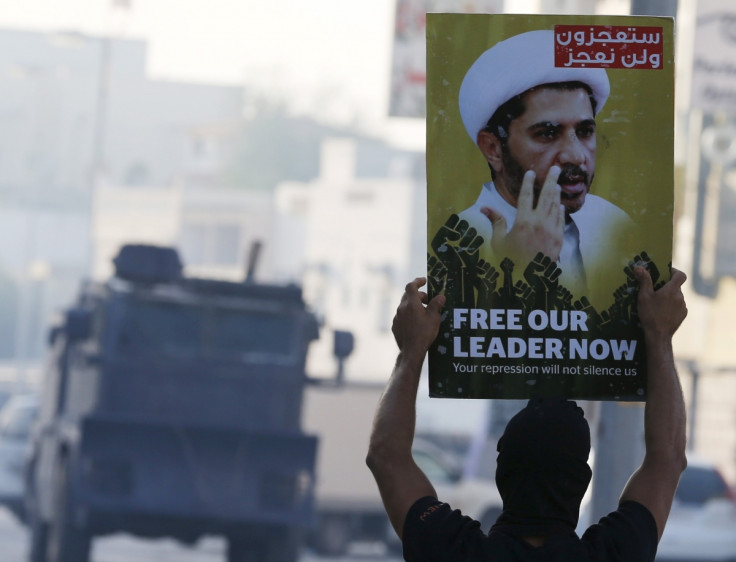Saudi Arabia executions: Tear gas fired during Bahrain protests against killing of Sheik Nimr al-Nimr

Bahrain police have fired tear gas at protestors who have taken to the streets following the execution of prominent cleric Sheik Nimr al-Nimr in neighbouring Saudi Arabia. Demonstrators burned cars and held pictures of Sheik al-Nimr as they confronted security forces in the mainly Shia village of Abu-Saiba, west of the capital Manama, as well as other locations in the Gulf state.
The execution – one of 47 held on New Year's Day in the kingdom – is set to increase sectarian tensions across the region after Tehran, a number of human rights groups and Shia politicians in the region condemned the execution of al-Nimr. Of the Bahrain's 1.3 million citizens, 66%-70% are Shia Muslims, although they are ruled by a Sunni king – Hamad bin Isa Al Khalifa.
Protests have also taken place in Qatif, Saudi Arabia, near al-Nimr's home village of al-Awamiya. With marchers shouting "down with the Al Saud" (Saudi Arabia's ruling family)
Demand for reform in Saudi's neighbour
Bahrain's authorities have faced Shia-led protests for reforms to the country's ruling monarchy since 2011. Since then more than 90 people, including at least 18 policemen, have been killed in protests at associated attacks in Bahrain.
On 29 December a Bahrain court sentenced 29 people to jail terms ranging from five years to life for a bombing in which police officers were injured. And on 31 December 2015, one person was sentenced to death and 22 others to life in prison over two deadly bomb attacks in two villages that occurred in December 2014. All the accused were Shia Muslims and all had their citizenships revoked.
Photos reportedly showing beginnings of a demonstration in #KSA's Shia majority #Qatif Region pic.twitter.com/IdoXIeP7BI
— Miriam Goldman (@Miriam411) January 2, 2016Amnesty International have said Bahrain has committed "rampant" human rights abuses against opposition activists and anti-government protesters, including torture and excessive use of force against peaceful government critics, including some as young as 17.
Al-Nimr criticised Bahrain
Sheik Al-Nimr had been a vocal critic of the country's leadership, especially after Saudi Arabia sent their army to help Bahrain quash an uprising.
Some photos showing tire fires set in various areas of #Bahrain to condemn #Nimr's execution pic.twitter.com/ddnxZ7aphj
— Miriam Goldman (@Miriam411) January 2, 2016Al-Nimr was arrested in July 2012 by Saudi authorities and convicted of terror offences for his role in anti-government and pro-reform protests. He accused of, among other charges, shooting at a Saudi policeman. He was sentenced to death and was executed on 1 January, 2016.
His execution was met anger from Khalaf Abdelsamad, from Iraq's ruling Shia Dawa party. "Abdelsamad urges the Iraqi government to close down the Saudi embassy, expel the ambassador and execute all Saudi terrorists in Iraqi prisons," a statement from his office said.
Brother's call for peace
But Sheik Nimr's brother today called for calm, despite his son Ali Mohammed al-Nimr, 21, facing execution by crucifixion for alleged participation in the anti-government protests when he was 17.
#كرامتنا_من_الله_الشهادة
شوارع #البحرين تشتعل غضبًا تنديدًا بجريمة آل سعود البشعة بإعدام سماحة آية الله الشيخ النمر. pic.twitter.com/i1ahD4xRec
— شبكة احرار الحريه (@a7raral7reya) January 2, 2016Mohammed al-Nimr told AFP: "This action will spark anger of (Shia) youths. We reject violence and clashing with authorities, just like the martyr sheikh rejected it.
"There will be negative reactions from within the kingdom and abroad. But we hope for peaceful reactions."
Human rights group Reprieve has condemned the Saudi state, claiming that two of those executed were teenagers when they were detained. Ali al-Ribh, was 18 when he was arrested in 2012, and another, Mohammed al-Shuyokh, was 19.
© Copyright IBTimes 2025. All rights reserved.




















